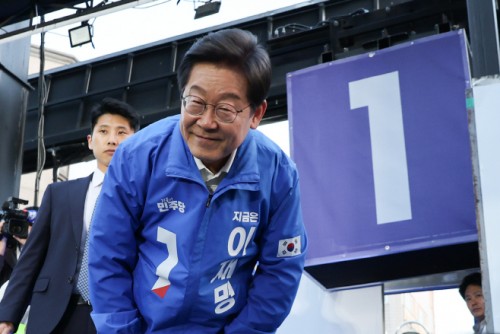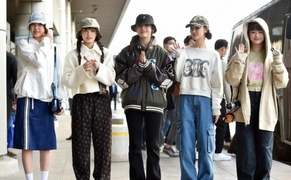 |
| Lee Jae-myung, presidential candidate of the Democratic Party of Korea (DPK), greets citizens during a campaign rally on Shinbu Cultural Street in Dongnam District, Cheonan, South Chungcheong Province, on May 25. / Source: Yonhap News |
Democratic Party of Korea (DPK) presidential candidate Lee Jae-myung has vowed to pursue mutually beneficial inter-Korean dialogue and cooperative engagement. On May 25, DPK lawmaker Wi Sung-lac emphasized that while deterrence against North Korea’s growing missile capabilities remains necessary, it is not sufficient to achieve denuclearization. Instead, dialogue and negotiation must be resumed.
In a press briefing at DPK headquarters, Wi stated, “We will adopt a strategy that balances deterrence with diplomacy to realize denuclearization. Responding with deterrence alone to North Korea’s missile advancements will not lead to denuclearization. Only through renewed dialogue and negotiation can this goal be achieved.”
He added that “as signs emerge of renewed dialogue between North Korea and the United States, we are exploring ways to take advantage of this momentum.”
On the issue of the United States classifying South Korea as a "sensitive country" in the context of scientific and technological collaboration, Wi said the DPK would push for the designation to be lifted. “Such a label restricts bilateral cooperation, and we intend to analyze the causes and respond appropriately,” he explained.
Wi also drew a firm line against nuclear armament. “The DPK categorically distances itself from both nuclear armament and the notion of latent nuclear capabilities. Our stance on nuclear energy is purely based on peaceful, industrial, and economic use,” he said.
Regarding regional diplomacy, Wi noted that South Korea’s relations with China and Russia have recently reached their lowest point since normalization. “This simultaneous downturn has led to less constructive positions from both countries regarding North Korea’s nuclear and missile threats,” he said.
He stressed the importance of managing relations with China and Russia while maintaining the core alliance framework. “We will manage our ties with China and Russia appropriately while basing our diplomacy on the pillars of the South Korea-U.S. alliance, South Korea-Japan cooperation, and trilateral security coordination among Seoul, Washington, and Tokyo,” Wi stated.
On the proposal to institutionalize a bipartisan foreign policy consultative body, Wi explained, “While no specific structure has been defined, we hope to form a platform for gathering bipartisan wisdom. It will require agreement across party lines.”
Regarding the creation of a centralized command structure for economic security, Wi said, “Currently, economic and security issues are handled by separate departments. To improve coordination and collaboration, we intend to strengthen the control tower function within the presidential office.”
On the topic of Ukraine’s reconstruction, Wi commented, “There are signs of a possible ceasefire in the war. If that occurs, the environment will shift significantly, and we aim to actively participate in post-war reconstruction efforts to contribute meaningfully.”
Most Read
-
1
-
2
-
3
-
4
-
5
-
6
-
7





















